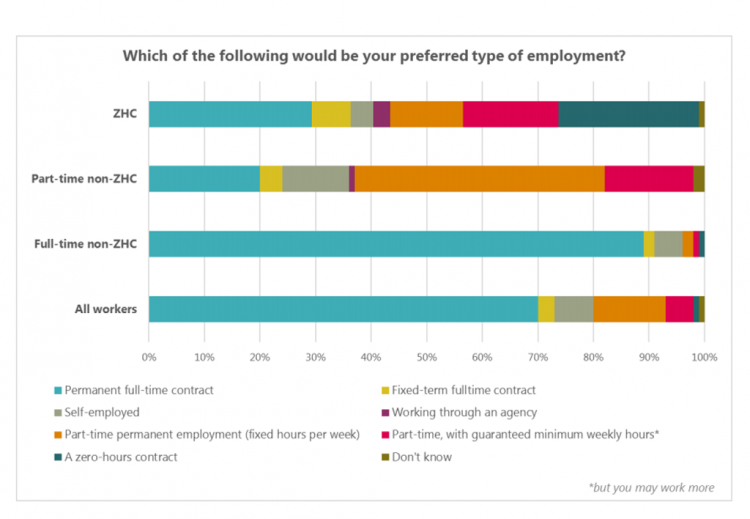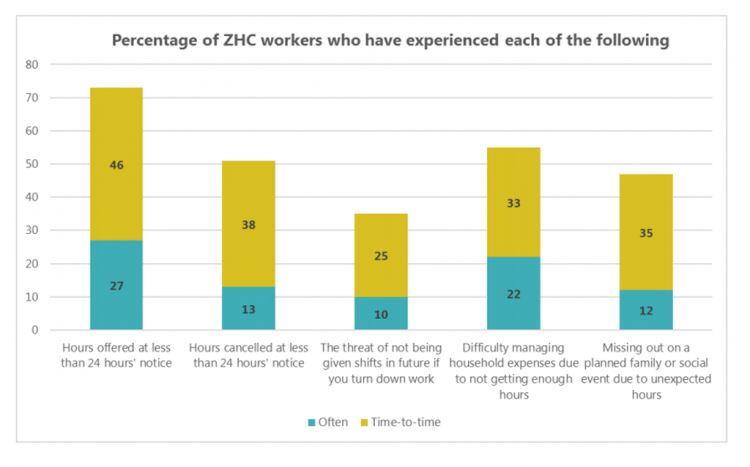780,000 workers are stuck on zero-hours contracts - time to ban them outright

The latest figures are in: the number of people working on zero-hours contracts (ZHCs) now stands at 780,000.
This is a fall of over 120,000 since the end of last year, so let's hope bosses are finally getting the message on ZHCs.
But buried in the figures was evidence that almost two thirds of workers on ZHCs have been stuck on them for more than a year.
That means hundreds of thousands are still trapped in jobs that are often so insecure they’re unable to plan childcare or budget for their weekly shop.
Employers who use ZHCs like to claim they offer flexibility and choice.
But when we’ve interviewed workers stuck on these contracts, they’ve told us it’s the only type of work available.
Whether it’s shift patterns that change every week or hours being cut at the last minute, workers are clear that they’re really struggling to make ends meet on ZHCs.
That’s why we’re calling for an outright ban on ZHCs and for workers to get guaranteed hours that allow them to pay bills and plan ahead.
And we want to see action to reduce other forms of insecure work that are making workers’ lives a misery.
If you agree that we need to ban ZHCs, sign our petition here.
I can’t get a mortgage as a supply teacher. I have no job security. I don’t get holiday pay or sick pay. I’ve missed appointments for my own children as I don’t feel able to ask to have a day off as I have no contract.
Hobson’s choice
One of the arguments in favour of zero-hours contracts is that they offer flexibility for employer and worker alike.
Employers often say workers like ZHCs because they want to have to be able to choose when to work.
But our polling shows that two thirds of workers would rather have a contract with guaranteed hours – and only one in four prefer being on a ZHC.
So far from enjoying more choice, thousands of people are being forced into accepting ZHCs because there’s nothing better on offer.
In other words, workers face a Hobson’s Choice between the long-term insecurity of a ZHC job or no job at all.

Poor conditions
It’s hardly surprising that workers don’t like ZHCs when you look at many of their experiences at work.
Time and time again people have told us how difficult it is to make ends meet on a ZHC.
One female worker in the catering industry said that some weeks she earned nothing at all because of the irregular shifts she was forced to work.
And because the shifts are so irregular, she couldn’t even find another job as she can often be called in last minute.
A nanny also reported how her hours were changed at such short notice that her earnings for the week were suddenly cut in half.

Loss of rights
Then there’s the issue of key workplace rights, such as protection against unfair dismissal and sick pay, which we know many workers on zero hours contracts miss out on.
One bar worker in a football stadium told us that managers “don’t care about staff and anyone who complains is ‘replaced’”.
And according to our research, nearly 500,000 workers on ZHCs and in other forms of insecure temporary work miss out on the right to statutory sick pay because they don’t earn enough to qualify.
A pub duty manager on a ZHC told us that she’d been told several times by doctors to take time off from a back injury done in work but that she simply couldn’t afford it.
There is essentially no sick pay (missing a shift gets you squat), and doctor’s appointments and recovery times after surgery have been taken using holiday time because of this
Taylor Review
It’s clear that workers on ZHCs are being treated like disposable labour – and that this needs to change urgently.
That’s why we’ve criticised the Taylor review’s recommendation that those on ZHCs be given a legal ‘right to request’ regular hours after a year on the job.
This is no right at all for the most insecure workers, as employers would still be able to refuse such a request.
And staff with little power at work may be unwilling to risk making it for fear of losing out on hours in the future.
Instead, the government should simply ban zero-hours contracts outright.
Tip of the iceberg
ZHCs are only one part of the problem of insecure work in the UK.
From bogus self-employment to underpaid agency workers, our research shows that 1 in 9 workers – at least 3.8 million – are now trapped in some form of insecure work.
Today’s figures are a reminder that this problem is not going away, even if it is good news that the numbers have started to go down at last.
That’s why we need a new deal for working people so that every worker has the right to a contract that guarantees the hours they work.
If ministers are serious about building a country that works for everyone, they must act now to ensure every worker gets fair pay, decent rights and a voice at work.
Stay Updated
Want to hear about our latest news and blogs?
Sign up now to get it straight to your inbox
